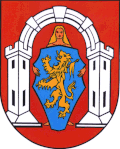| anti-Cyrillic protests in Croatia | |
|---|---|
| Part of response to introduction of minority Serbian Cyrillic alphabet in co-official use in town of Vukovar | |
 A banner that says "Vukovar, not Вуковар" (Vukovar a ne Вуковар) in Serbo-Croatian. | |
| Location | |
| Caused by | Start of application of bilingualism officially introduced in 2009 in town of Vukovar |
| Goals | Opposition to usage of minority languages and seeking modification of Constitutional Law on National Minorities rights |
| Methods | Vandalism, sabotage |
| Status | Protests mostly ended; occasional ongoing minor vandalism in areas with Serbian population |
| HQs for defense of Croatian Vukovar | |
![Anti-Cyrillic Graffiti ("Vukovar and not Vukovar [sic]!") depicting the U symbol of the Ustashe 20130609 Zagreb 041.jpg](http://upload.wikimedia.org/wikipedia/commons/thumb/a/a5/20130609_Zagreb_041.jpg/250px-20130609_Zagreb_041.jpg)
The anti-Cyrillic protests in Croatia were a series of protests in late 2013 against the application of bilingualism in Vukovar, whereby Serbian and the Serbian Cyrillic alphabet were assigned co-official status due to the local minority population. The implementation of this decision became mandatory after the 2011 Croatian census, according to which Serbs in Vukovar comprised more than one-third (34.8%) of Vukovar's total population. [1] [2] Signs in the Serbian Cyrillic alphabet had been put up as the Constitutional Act on the Rights of National Minorities mandates bilingual signs in any area where more than one-third of the population belongs to an ethnic minority. [1] [3] This decision became subject of intense agitation by, among others, Croatian war veterans and many ordinary citizens who believe that due to events, particularly the Battle of Vukovar, the city should have been excluded from the application of the law on minority rights, although protests and vandalism have occurred in other towns and cities (i.e. Split, Dubrovnik, etc). [2] The Serbs of Croatia are a minority group that have the narrowest usage of right to bilingualism among all national minorities in Croatia. [4]
Contents
- Reactions
- Croatia
- International
- Chronology
- 2019
- 2018
- 2017
- 2015
- 2014
- 2013
- 2012
- Historical bans on usage of Cyrillic in Vukovar
- See also
- References
A group called HQs for defense of Croatian Vukovar initiated protest rallies on 2 September, as soon as the placement of the signs written in both the Latin and the Cyrillic scripts began in Vukovar. [5] With protests in Vukovar, in April 2013 there were also organized protests in Zagreb's main square with around 20,000 participants. [6] Parallel protests were held in Tovarnik, [7] Bogdanovci, [8] Lovas, [8] and Nuštar. [9] A number of signs in the Serbian Cyrillic alphabet were torn down, others were smashed with hammers, and protesters clashed with the police, leaving four police officers slightly injured. [10] Some of supporters not directly connected to the protesters organized actions of writing pro-fascist Ustaše graffiti on the Orthodox Church of the Holy Annunciation in Dubrovnik and in Zadar. [11] [12]
On 12 August 2014 the Constitutional Court of Croatia decided that referendum proposal on the restriction of the use of minority languages in such a way to increase the required proportion of total population to 50%, is unconstitutional. [13] The City Council of Vukovar was required to regulate the use of minority languages in its statute within a year after the court decision. [13] The Government of Croatia was required to define the legal mechanisms for cases when the representative bodies of local self-government do not implement the obligations under the Law regarding minority languages. [13] National authorities competent for implementation of laws on minority languages were instructed not to implement the Law in the City of Vukovar by use of coercive measures until the government of Croatia fulfills its obligation. [13]
In April 2015 the United Nations Human Rights Committee urged Croatia to ensure the right of minorities to use their language and alphabet. [14] Committee report stated that particularly concerns the use of Serbian Cyrillic in the town of Vukovar and municipalities concerned. [14] Serbian Foreign Minister Ivica Dačić said that his country welcomes the UN Human Rights Committee's report. [15]
On 17 August 2015, under requirement of the Constitutional Court of Croatia, the City Council of Vukovar decided to amend the city statute in such a way as not to provide bilingual signs in Latin and Cyrillic scripts at official town buildings, institutions, squares and streets. The Council of Europe stated its regret about this decision. [16] The decision was taken by MPs from Croatian Democratic Union and Croatian Democratic Alliance of Slavonia and Baranja while MPs from Social Democratic Party of Croatia, Independent Democratic Serb Party and Croatian People's Party – Liberal Democrats left the session at which the decision was taken. [17] The Ministry of Public Administration announced that it would overturn the decision if it is established to be contrary to the constitution. [18]
The local civic society The city, that's us too suggested that the dispute could be resolved by putting on the right side of the entrance to local government buildings a sign in Croatian Latin script, and on the left side a sign in the languages and scripts of ethnic minorities living in Vukovar. [19]

